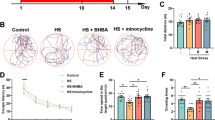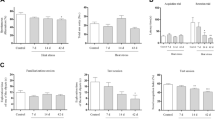Abstract
Background
The current study was set to assess the effect of heat stress exposure on oxidative stress, apoptosis, and endoplasmic reticulum stress markers in the cerebellum of male mice.
Methods
Fifty male C57BL/6 mice were assigned to five groups of (I) control, (II) heat stress (HS)7, (III) HS14, (IV) HS21, and (V) HS42 groups. Animals in the control group were not exposed to HS. Mice in the II-V groups were exposed to HS once a day over 7, 14, 21, and 42 days, respectively. Cerebellar reactive oxygen species (ROS) levels, expression of heat shock protein (HSP)70 and caspase 3 as well as endoplasmic reticulum stress-related proteins (PERK, p-PERK, CHOP, and Full-length ATF-6) expression were determined on the 7th, 14th, 21st, and 42nd days.
Results
ROS levels and HSP70 expression increased following HS on the 14th, 21st, and 42nd days and the 7th, and 14th days with a peak level of expression on the 14th day following HS. HSP70 levels decreased afterward on the 21st and 42nd days compared with the control group. Besides, exposure to HS for 14, 21, and 42 days resulted in a significant increase in the CHOP and p-PERK levels in the cerebellum compared with the control group. Heat exposure also increased protein expression of cleaved caspase 3 and active ATF-6/Full–length ATF-6 on the 21st and 42nd days in the cerebellum compared with the control animals.
Conclusion
These findings indicated that chronic HS augmented oxidative stress, endoplasmic reticulum stress, and apoptosis pathways in the cerebellum of mice.



Similar content being viewed by others
Data availability
The authors of this paper assure that data being reported in this research are accurate.
References
De Blois J et al (2015) The effects of climate change on cardiac health. Cardiology 131(4):209–217
McMichael AJ, Lindgren E (2011) Climate change: present and future risks to health, and necessary responses. J Intern Med 270(5):401–413
Bouchama A, Knochel JP (2002) Heat stroke. N Engl J Med 346(25):1978–1988
Fuse A et al (2013) Reversible focal cerebral cortical lesions in a patient with heat stroke. Intern Med 52(3):377–380
Szold O et al (2002) Gray–white matter discrimination—a possible marker for brain damage in heat stroke? Eur J Radiol 43(1):1–5
Li C-W et al (2013) Heme oxygenase-1 aggravates heat stress-induced neuronal injury and decreases autophagy in cerebellar purkinje cells of rats. Exp Biol Med 238(7):744–754
Sharma H, Muresanu D, Sharma A (2013) Heat stress induces selective cell damage in the cerebellum. An experimental study using immunohistochemistry and ultrastructural investigations in rats. J Neurol Sci 333:e164
Nasrolahi A et al (2020) Cardioprotective effect of Rosa canina L. methanolic extract on heat shock induced cardiomyocyte injury: an experimental study. J Cardiovasc Thorac Res 12(4):286
Yang C-Y, Lin M-T (2002) Oxidative stress in rats with heatstroke-induced cerebral ischemia. Stroke 33(3):790–794
White MG et al (2003) Caspase activation contributes to delayed death of heat-stressed striatal neurons. J Neurochem 87(4):958–968
Yang H et al (2019) Flavangenol regulates gene expression of HSPs, anti-apoptotic and anti-oxidative factors to protect primary chick brain cells exposed to high temperature. J Therm Biol 81:1–11
Gu Z et al (2014) Heat stress induces apoptosis through transcription-independent p53-mediated mitochondrial pathways in human umbilical vein endothelial cell. Sci Rep 4(1):1–10
Yang Y et al (2020) Ursolic acid alleviates heat stress-induced lung injury by regulating endoplasmic reticulum stress signaling in mice. J Nutr Biochem 89:108557
Chen F et al (2008) Hyperthermia in combination with oxidative stress induces autophagic cell death in HT-29 colon cancer cells. Cell Biol Int 32(7):715–723
Wallace EW et al (2015) Reversible, specific, active aggregates of endogenous proteins assemble upon heat stress. Cell 162(6):1286–1298
Sharma HS, Westman J (2004) The heat shock proteins and hemeoxygenase response in central nervous system injuries. Blood-spinal cord and brain barriers in health and disease. Elsevier, Amsteram, pp 329–360
Mustafi SB et al (2009) Heat stress upregulates chaperone heat shock protein 70 and antioxidant manganese superoxide dismutase through reactive oxygen species (ROS), p38MAPK, and Akt. Cell Stress Chaperones 14(6):579
Schiaffonati L et al (2001) Hyperthermia induces gene expression of heat shock protein 70 and phosphorylation of mitogen activated protein kinases in the rat cerebellum. Neurosci Lett 312(2):75–78
Bazille C et al (2005) Brain damage after heat stroke. J Neuropathol Exp Neurol 64(11):970–975
Lee W et al (2015) Heat stress-induced memory impairment is associated with neuroinflammation in mice. J Neuroinflamm 12:102
Erfani M et al (2019) Rosa canina L. methanolic extract prevents heat stress-induced memory dysfunction in rats. Exp Physiol 104(10):1544–1554
Wang T et al (2009) Protection by tetrahydroxystilbene glucoside against cerebral ischemia: involvement of JNK, SIRT1, and NF-κB pathways and inhibition of intracellular ROS/RNS generation. Free Radic Biol Med 47(3):229–240
Chauhan NR et al (2020) Heat stress induced oxidative damage and perturbation in BDNF/ERK1/2/CREB axis in hippocampus impairs spatial memory. Behav Brain Res 396:112895
Chang C-K et al (2007) Oxidative stress and ischemic injuries in heat stroke. Prog Brain Res 162:525–546
Belhadj Slimen I et al (2014) Reactive oxygen species, heat stress and oxidative-induced mitochondrial damage. A review. Int J Hyperth 30(7):513–523
Hassan F-U et al (2019) Prospects of HSP70 as a genetic marker for thermo-tolerance and immuno-modulation in animals under climate change scenario. Anim Nutr 5(4):340–350
Kirkegaard T et al (2010) Hsp70 stabilizes lysosomes and reverts niemann-pick disease-associated lysosomal pathology. Nature 463(7280):549–553
Rozhkova E et al (2010) Exogenous mammalian extracellular HSP70 reduces endotoxin manifestations at the cellular and organism levels. Ann N Y Acad Sci 1197:94–107
Doeppner TR et al (2009) TAT-Hsp70-mediated neuroprotection and increased survival of neuronal precursor cells after focal cerebral ischemia in mice. J Cereb Blood Flow Metab 29(6):1187–1196
Bobkova N et al (2013) Dynamics of endogenous Hsp70 synthesis in the brain of olfactory bulbectomized mice. Cell Stress Chaperones 18(1):109–118
Foster NL, Lukowiak K, Henry TB (2015) Time-related expression profiles for heat shock protein gene transcripts (HSP40, HSP70) in the central nervous system of Lymnaea stagnalis exposed to thermal stress. Commun Integr Biol 8(3):e1040954
Manjari R et al (2015) HSP70 as a marker of heat and humidity stress in Tarai buffalo. Trop Anim Health Prod 47(1):111–116
Truettner JS et al (2007) Subcellular stress response after traumatic brain injury. J Neurotrauma 24(4):599–612
Dash PK et al (2015) Inhibition of eukaryotic initiation factor 2 alpha phosphatase reduces tissue damage and improves learning and memory after experimental traumatic brain injury. J Neurotrauma 32(20):1608–1620
Boyce M, Yuan J (2006) Cellular response to endoplasmic reticulum stress: a matter of life or death. Cell Death Differ 13(3):363–373
Caballano-Infantes E et al (2017) Regulation of mitochondrial function and endoplasmic reticulum stress by nitric oxide in pluripotent stem cells. World J Stem Cells 9(2):26
Galehdar Z et al (2010) Neuronal apoptosis induced by endoplasmic reticulum stress is regulated by ATF4–CHOP-mediated induction of the Bcl-2 homology 3-only member PUMA. J Neurosci 30(50):16938–16948
Marciniak SJ et al (2004) CHOP induces death by promoting protein synthesis and oxidation in the stressed endoplasmic reticulum. Genes Dev 18(24):3066–3077
Aghazadeh A et al (2020) Effects of hyperthermia on TRPV1 and TRPV4 channels expression and oxidative markers in mouse brain. Cell Mol Neurobiol. https://doi.org/10.1007/s10571-020-00909-z
Mahmoudi J et al (2021) Sericin alleviates thermal stress induced anxiety-like behavior and cognitive impairment through regulation of oxidative stress, apoptosis, and heat-shock protein-70 in the hippocampus. Neurochem Res. https://doi.org/10.1007/s11064-021-03370-6
Acknowledgements
The authors thank Neurosciences Research Center staff for their support and assistance with this project.
Funding
This research was supported by a grant from the Neurosciences Research Center, Tabriz University of Medical Sciences (Grant Number:63833) to J-M.
Author information
Authors and Affiliations
Contributions
LH and HO performed the experiments. SRA and AM analyzed interpreted the data. FF, JM, and SSE designed the experiments and edited the paper. SS and JM contributed to the interpretation of the data. All authors read and approved the final manuscript.
Corresponding author
Ethics declarations
Conflict of interest
Authors declare no competing interests related to this article.
Ethical approval
All experiments were approved and performed under the guidelines of the Ethics Committee of Animal Research at the Tabriz University of Medical Sciences (IR.TBZMED.VCR.REC.1398.285) and the National Institutes of Health Guide for Care and Use of Laboratory Animals (Publication Number: 85–23, revised 1985).
Consent for publication
Authors give consent for the aforementioned content to be published in this journal.
Additional information
Publisher's Note
Springer Nature remains neutral with regard to jurisdictional claims in published maps and institutional affiliations.
Rights and permissions
About this article
Cite this article
Oghbaei, H., Hosseini, L., Farajdokht, F. et al. Heat stress aggravates oxidative stress, apoptosis, and endoplasmic reticulum stress in the cerebellum of male C57 mice. Mol Biol Rep 48, 5881–5887 (2021). https://doi.org/10.1007/s11033-021-06582-9
Received:
Accepted:
Published:
Issue Date:
DOI: https://doi.org/10.1007/s11033-021-06582-9




